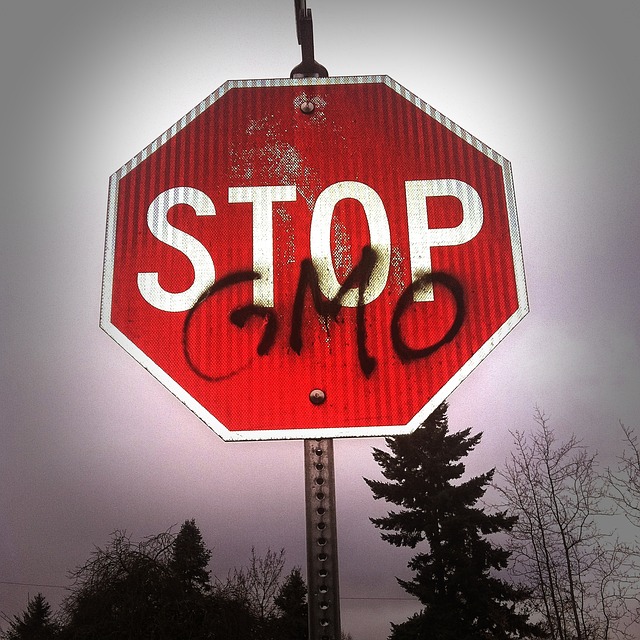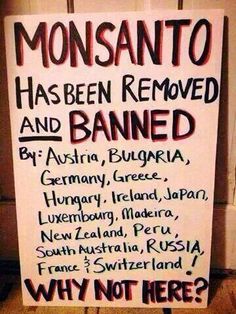
In 1991, Michael Crichton had Jurassic Park published. This was at the earlier stages of our GMO and genetic engineering craze. Things have only progressed even faster since that point with dozens of crops and even animals having been genetically modified and allowed to escape into the wild.
For this month’s post, I wanted to quote some fascinating words Crichton penned over 25 years ago to give us a warning of how allowing science complete and total free reign (with a feigned sense of governmental control) is dangerous to us as a species. The US has the most GMO crops allowed in both growth and in foods. Our government has thwarted all labeling laws that allow everyone, regardless of income level and education, to know what they are putting in their bodies. They also continually deny GMOs pose any health risk. However, we are the lowest in developed countries for health. Just because we don’t immediatly die from our diets does not mean they have no effect on us. Look at the rise in chronic diseases we now consider “normal.” Look how autism is now labeled as something a child is born with in spite of hundreds of studies showing this isn’t the case.
The part from the introduction about how scientists are no longer detached observers is highlighted by the FDA itself and the prime defender of vaccines, Paul Offit.
So I hope you enjoy these quotes from Crichton. If you don’t, I hope it at least gives you some pause to show you have the intelligence and humanity to have a inkling of doubt arise in your mind. Hopefully we can nourish that inkling and make this world a better place together.

From Jurassic Park by Michael Crichton. (Crichton, Michael. Jurassic Park. London: Random Century Group 20, 2006. Print.)
From chapter: Introduction
The late twentieth century has witnessed a scientific gold rush of astonishing proportions: the headlong and furious haste to commercialize genetic engineering. This enterprise has proceeded so rapidly-with so little outside commentary-that its dimensions and implications are hardly understood at all.
Biotechnology promises the greatest revolution in human history. By the end of this decade, it will have outdistanced atomic power and computers in its effect on our everyday lives. In the words of one observer, “Biotechnology is going to transform every aspect of human life: our medical care, our food, our health, our entertainment, our very bodies. Nothing will ever be the same again. It’s literally going to change the face of the planet.”
But the biotechnology revolution differs in three important respects from past scientific transformations.
First, it is broad-based. America entered the atomic age through the work of a single research institution, at Los Alamos. It entered the computer age through the efforts of about a dozen companies. But biotechnology research is now carried out in more than two thousand laboratories in America alone. Five hundred corporations spend five billion dollars a year on this technology.
Second, much of the research is thoughtless or frivolous. Efforts to engineer paler trout for better visibility in the stream, square trees for easier lumbering, and injectable scent cells so you’ll always smell of your favorite perfume may seem like a joke, but they are not. Indeed, the fact that biotechnology can be applied to the industries traditionally subject to the vagaries of fashion, such as cosmetics and leisure activities, heightens concern about the whimsical use of this powerful new technology.
Third, the work is uncontrolled. No one supervises it. No federal laws regulate it. There is no coherent government policy, in America or anywhere else in the world. And because the products of biotechnology range from drugs to farm crops to artificial snow, an intelligent policy is difficult.
But most disturbing is the fact that no watchdogs are found among scientists themselves. It is remarkable that nearly every scientist in genetics research is also engaged in the commerce of biotechnology. There are no detached observers. Everybody has a stake.
The commercialization of molecular biology is the most stunning ethical event in the history of science, and it has happened with astonishing speed. For four hundred years since Galileo, science has always proceeded as a free and open inquiry into the workings of nature. Scientists have always ignored national boundaries, holding themselves above the transitory concerns of politics and even wars. Scientists have always rebelled against secrecy in research, and have even frowned on the idea of patenting their discoveries, seeing themselves as working to the benefit of all mankind. And for many generations, the discoveries of scientists did indeed have a peculiarly selfless quality.
When, in 1953, two young researchers in England, James Watson and Francis Crick, deciphered the structure of DNA, their work was bailed as a triumph of the human spirit, of the centuries-old quest to understand the universe in a scientific way. It was confidently expected that their discovery would be selflessly extended to the greater benefit of mankind.
Yet that did not happen. Thirty years later, nearly all of Watson and Crick’s scientific colleagues were engaged in another sort of enterprise entirely. Research in molecular genetics had become a vast, multibillion dollar commercial undertaking, and its origins can be traced not to 1953 but to April 1976.
That was the date of a now famous meeting, in which Robert Swanson, a venture capitalist, approached Herbert Boyer, a biochemist at the University of California. The two men agreed to found a commercial company to exploit Boyer’s gene-splicing techniques. Their new company, Genentech, quickly became the largest and most successful of the genetic engineering start-ups.
Suddenly it seemed as if everyone wanted to become rich. New companies were announced almost weekly, and scientists flocked to exploit genetic research. By 1986, at least 362 scientists, including 64 in the National Academy, sat on the advisory boards of biotech firms. The number of those who held equity positions or consultancies was several times greater.
It is necessary to emphasize how significant this shift in attitude actually was. In the past, pure scientists took a snobbish view of business. They saw the pursuit of money as intellectually uninteresting, suited only to shopkeepers. And to do research for industry, even at the prestigious Bell or IBM labs, was only for those who couldn’t get a university appointment. Thus the attitude of pure scientists was fundamentally critical toward the work of applied scientists, and to industry in general. Their long-standing antagonism kept university scientists free of contaminating industry ties, and whenever debate arose about technological matters, disinterested scientists were available to discuss the issues at the highest levels.
But that is no longer true. There are very few molecular biologists and very few research institutions without commercial affiliations. The old days are gone. Genetic research continues, at a more furious pace than ever. But it is done in secret, and in haste, and for profit.
From chapter: Control
“You know what we are really talking about here,” Malcolm said. “All this attempt to control… We are talking about Western attitudes that are five hundred years old. They began at the time when Florence, Italy, was the most important city in the world. The basic idea of science-that there was a new way to look at reality, that it was objective, that it did not depend on your beliefs or your nationality, that it was rational-that idea was fresh and exciting back then. It offered promise and hope for the future, and it swept away the old medieval system, which was hundreds of years old. The medieval world of feudal politics and religious dogma and hateful superstitions fell before science. But, in truth, this was because the medieval world didn’t really work any more.
It didn’t work economically, it didn’t work intellectually, and it didn’t fit the new world that was emerging.
Malcolm coughed.
“But now,” he continued, “science is the belief system that is hundreds of years old. And, like the medieval system before it, science is starting not to fit the world any more. Science has attained so much power that its practical limits begin to be apparent. Largely through science, billions of us live in one small world, densely packed and intercommunicating. But science cannot help us decide what to do with that world, or how to live. Science can make a nuclear reactor, but it cannot tell us not to build it. Science can make pesticide, but cannot tell us not to use it. And our world starts to seem polluted in fundamental ways-air, and water, and land-because of ungovernable science.” He sighed. “This much is obvious to everyone.”
…
“At the same time, the great intellectual justification of science has vanished. Ever since Newton and Descartes, science has explicitly offered us the vision of total control. Science has claimed the power to eventually control everything, through its understanding of natural laws. But in the twentieth century, that claim has been shattered beyond repair. First, Heisenberg’s uncertainty principle set limits on what we could know about the subatomic world. Oh well, we say. None of us lives in a subatomic world. It doesn’t make any practical difference as we go through our lives. Then Gödel’s theorem set similar limits to mathematics, the formal language of science. Mathematicians used to think that their language had some special inherent trueness that derived from the laws of logic. Now we know that what we call ‘reason’ is just an arbitrary game. It’s not special, in the way we thought it was.
“And now chaos theory proves that unpredictability is built into our daily lives. It is as mundane as the rainstorm we cannot predict. And so the grand vision of science, hundreds of years old-the dream of total control-has died, in our century. And with it much of the justification, the rationale for science to do what it does. And for us to listen to it. Science has always said that it may not know everything now but it will know, eventually. But now we see that isn’t true. It is an idle boast. As foolish, and as misguided, as the child who jumps off a building because he believes he can fly.”
…
“We are witnessing the end of the scientific era. Science, like other outmoded systems, is destroying itself. As it gains in power, it proves itself incapable of handling the power. Because things are going very fast now. Fifty years ago, everyone was gaga over the atomic bomb. That was power. No one could imagine anything more. Yet, a bare decade after the bomb, we began to have genetic power. And genetic power is far more potent than atomic power. And it will be in everyone’s hands. It will be in kits for backyard gardeners. Experiments for schoolchildren. Cheap labs for terrorists and dictators, And that will force everyone to ask the same question- What should I do with my power?-which is the very question science says it cannot answer.”
“So what will happen?” Ellie said.
Malcolm shrugged. “A change.”
“What kind of change?”
“All major changes are like death,” he said. “You can’t see to the other side until you are there.”
